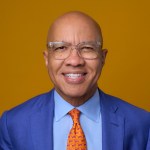Studio Museum Gala, Monday, October 24, 2016
Darren Walker accepts an award on behalf of the Ford Foundation, remarks as prepared.
Thank you for that wonderful introduction, Thelma. And for your incandescent, dazzling, brilliant leadership of this national treasure called the Studio Museum in Harlem.
Good evening everyone. On behalf of my colleagues Hilary Pennington and Elizabeth Alexander and everyone at Ford, I’m thrilled to be with you all tonight and delighted to join you in celebrating this singular institution.
Nearly fifty years ago, the Studio Museum was founded as an act of defiance and resistance. As the Civil Rights movement waged on, it was clear that the advent of a new world called for the advent of a new kind of museum. And through the years, this museum has defied expectations. It defied cultural norms. And it continues to defy gravity.
For most of the past five decades, it has operated with a board that did not possess the level of cumulative wealth that we see at other NYC museums, and it was often understaffed—in part because those other museums were constantly poaching its great staff.
Without the resources a museum like this deserves—without a big endowment or a world-class building—this museum has continued to extend that original act of defiance and resistance. It stands as a testament to the idea that excellence, discipline, and intelligence will always prevail in the face of seemingly insurmountable odds.
With the support of Lowery Stokes Sims, Thelma and her team have transformed this institution into a museum that should serve as a model for others around the globe. It must—because we are surrounded by massive inequality.
Whether we see our current crisis of inequality manifest itself in headlines about police shootings, or statistics about mass incarceration, or protests for the simple affirmation that black lives do matter—our challenge is clear and present.
We’ve found that among the key drivers of inequality are persistent stereotypes and cultural narratives that undermine fairness, tolerance, and inclusion. But fortunately, we’ve also seen—time and again—that one of our most powerful tools for rewriting these narratives is the arts.
The arts are unique in their ability to inspire empathy, to connect diverse audiences, regardless of their background, and to remind us of what we all share, of what connects us.
No museum does this more effectively than the Studio Museum. From the exhibitions you curate, to your commitment to education, you have sustained the museum’s tradition of bringing people together from all walks of life.
And for people from Harlem—and other neighborhoods like it—the museum inspires such immense pride and expands our community’s very sense of what’s possible.
When a child sees Jordan Casteel’s portraits of the vendors on 125th street, the vendors he passes every day on the way to school, that child learns that inspiration comes from our own communities. It’s not some foreign entity, but something that can flourish in our own backyard.
When we give artists of color the space to create as SMH does, we demonstrate—to artists and audiences alike—that not only do black lives matter, but that the creativity and ideas of black artists matter.
In this way, the Studio Museum is not only a beacon in the art world, but also an anchor on the frontlines of social justice. That’s why we are so excited that the museum is preparing to expand its facility to secure the future it deserves. Because we know—by reason and intuition, alike—that art and museums have a role in advancing justice.
As Dr. King himself once said, “Darkness cannot drive out darkness; only light can do that. Hate cannot drive out hate; only love can do that.”
And it’s incumbent upon us to remember—especially in these times—that division, and bigotry, and racism, and blame, and ignorance cannot make any nation great. Only empathy can do that. Without art, there is no empathy. And without empathy, there is no justice.
So let us continue to lift up these artists and institutions that help inspire empathy and justice in our world. Let us continue to give generously to the Studio Museum in Harlem—one of the crown jewels of our city’s cultural landscape.
My colleagues and I are deeply grateful and humble by this honor.
Thank you.
